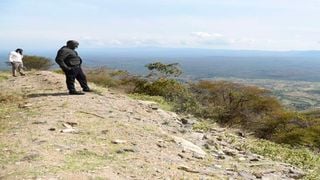
A view of Arror in Kerio Valley, Elgeyo Marakwet County on January 20, 2022. Mid-Rift Human Rights Network has said that marking boundaries and allowing legal ownership of land in the troubled Kerio Valley can help end violent attacks in the region
| Jared Nyataya | Nation Media GroupBaringo
Premium
Inside banditry-stricken Baringo villages
On Wednesday, a convoy of police vehicles with officers escorting the county security team and local leaders snaked its way to the banditry prone villages of Baringo South to quell the heightened tension that had gripped the area.
More than seven people, including a security officer, have been killed in the past one month, with four others nursing gunshot wounds.
More than 15 schools in the banditry prone Baringo North and Baringo South have been closed down, owing to the violence flare-ups, with more than 7,000 people displaced from their homes.
No one dare traverse the area without the escort of security officers armed to the teeth and wearing bullet-proof gear.
At Chemorongi’on shopping centre, people were in groups, talking in hushed tones as men armed with bows and arrows patrolled the area, keeping an eye out for gun-toting bandits roaming the villages.
This is where most of the people moved to after fleeing their homes. It is not the safest place, but the police camp a few metres away instilled a sense of security in the new arrivals.
At Kasiela shopping centre, shops were closed, with homesteads and the primary school completely deserted.
The previous night, two brothers had been shot dead by armed criminals as they fled from the attackers.
Mackvin Chepsat, 33, and David Chepsat, 29, both had gunshot wounds on their chests, the bodies lying 50 metres apart.
Invaded the area
Now, 18 hours later, at noon, three men -- the only people left in the area -- stood tensely by the road, waiting for the convoy to carry the bodies away.
The attackers had invaded the area on the morning of the day before and made away with 356 goats, 115 cows and 10 sheep.
They came back at 6pm and started shooting indiscriminately, killing the brothers whom they met on the way.
The previous day, a herder had been shot dead in an attack in the volatile Kapindasum, Baringo South, by armed criminals suspected to be from the neighbouring Tiaty Sub-county.
Baringo South Sub-County Police Commander David Too said Nanai Lekuroito was in the company of one other man, herding more than 40 calves along the banks of the Arabal River when they were ambushed.
During the 1:30pm incident, the herder was shot on the head at close range and died on the spot, while the other man managed to escape, but is still missing.
"It seems the bandits, who have invaded the area on the pretext of looking for pasture, were trailing the two before they ambushed and killed one of them," said Mr Too.
This brings to seven the number of people killed by bandits in Baringo since the beginning of the year.
The attack came a day after leaders and residents in the region held an interdenominational prayer at Lamaiywe in Baringo South to preach peaceful co-existence and end the spate of attacks.
The peace forum and prayers were led by the Labour CS Simon Chelugui, Governor Stanley Kiptis, MPs William Cheptumo (Baringo North), Charles Kamuren (Baringo South), Gladwell Cheruiyot (woman representative) and other local leaders.
Peace meetings
The affected families were fleeing towards Kabel, Mochongoi, Nyimbei and Chebinyiny villages with their few remaining animals, fearing more attacks by the armed criminals hiding in the Korkoron and Ng'elecha hills with the stolen livestock.
Ms Esther Wendot from Arabal protested at the peace meetings over the years that had not borne any fruits. She said most of the attacks happened after the forums aimed at bringing peace.
"As we speak, three people have been killed in a span of 24 hours, with all our entire livelihood wiped out. We don't have any reason to live anymore because our homes now are battlefields," said Ms Wendot.
She regretted that instead of going to school, their children were sleeping in the bush in faraway villages with no food or clothing.
"Why is the government not flushing out the bandits disguised as herders. We have made several calls to the relevant authorities but it seems it is falling on deaf years. They raid at will, killing people, stealing livestock and razing our homes," she said.
Mochongoi MCA Kipruto Kimosop hit out at the government for putting a lot of energy into arresting local leaders instead of the armed criminals.
"The government should avoid sideshows by arresting local leaders who are voicing their displeasure. We are disappointed because we appealed for a massive disarmament and redeployment of police reservists in the affected areas but none has been fulfilled despite the continued killings," said Mr Kimosop.
Mr Kamuren said the proliferation of arms in the troubled areas was a major setback to peace efforts, and urged the government to do a mop-up of the illegal arms.
"We cannot continue burying people killed by the bandits every time. As we speak, three people, including two brothers who were bread winners are dead, killed in a span of 24 hours. What do you think their families are going through at the moment?” he asked.
County Commissioner Abdirisack Jaldesa, on a tour to the affected villages in Sinoni, Kasiela and Lamaiywe, assured the locals of their safety, noting that the government had beefed up security in the area and there was no need for them to leave their homes.
“There is no cause for alarm because we are working on a lasting solution to flush out the criminals in their hideout once and for all. The government is also planning to deploy police reservists to complement security officers deployed in the war-torn areas and we are encouraging locals to go back to their homes,” said Mr Jaldesa.





